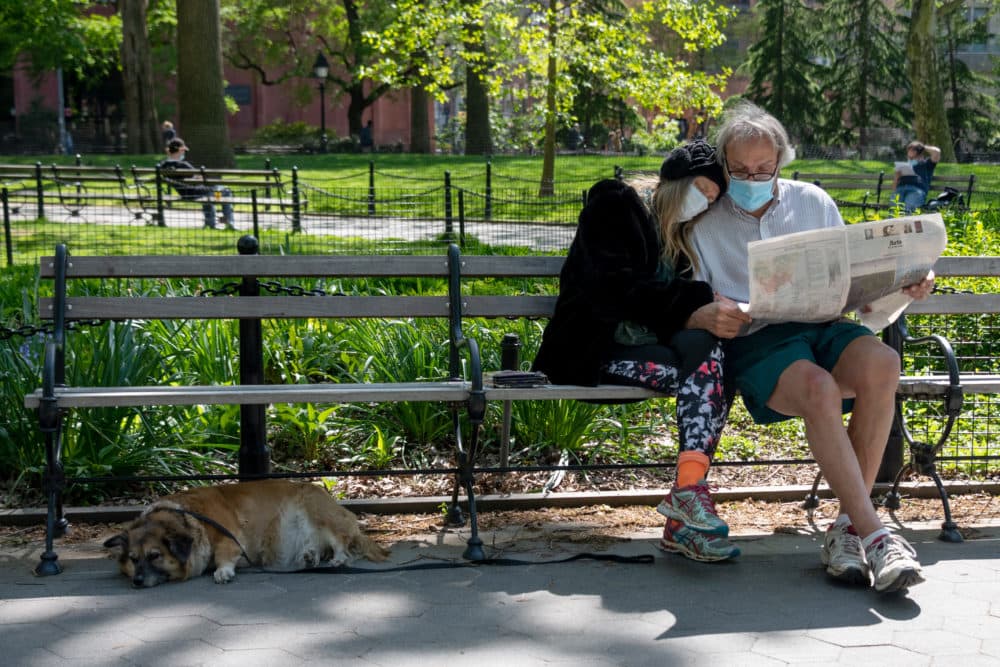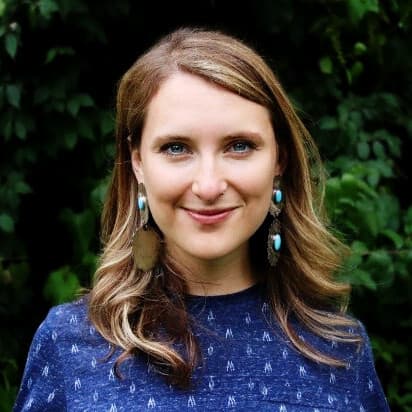Advertisement
On Point's Coronavirus Hours
Why Science Says Your Best Years Are Yet To Come

New studies show that even in the midst of a pandemic that disproportionately took older lives, people over 50 were generally mentally better off, more resilient — possibly even happier. We hear why science says your best years could be yet to come.
Guests
Dr. Laura Carstensen, director of the Stanford Center on Longevity. She led a research team that studied the emotional well-being of older people during the pandemic. (@LongevityCenter)
Dr. Alexandre Kalache, president of the International Longevity Centre, Brazil. Co-director of the Age Friendly Organization. (@alexkalache)
Ashton Applewhite, author of "This Chair Rocks: A Manifesto Against Ageism" and the Yo, Is This Ageist? blog. (@thischairrocks)
Also Featured
Jack and Judith Adler, retired doctor and social worker who participate in courses through the 92nd St Y's Himan Brown Senior Program.
Interview Highlights
What exactly did your research find about emotional resilience among people over 50, even in the middle of the pandemic?
Dr. Laura Carstensen: "We found that older people reported fewer negative emotions in their lives, and more positive emotions than younger people did. And this was a gradual slope starting from very early adulthood, well into old age. People, the older they were, reporting on balance, better emotional experience."
How did you measure that?
Dr. Laura Carstensen: "We asked them to tell us about 19 specific emotions. So some emotions positive and some were negative. Emotions like joy, calm, anger, frustration. And so they gave us ratings on each of those. And what we saw were very similar patterns. The negative ones were reported less frequently and less intensely, and the positive ones more so with age."
When you say frequently, is this something that you checked with people throughout the pandemic over time?
Dr. Laura Carstensen: "This was one survey. But we have used this approach in many of our studies over the years with the same emotions that we asked them about. And then some of those studies we use an approach called experience sampling where people are alerted at random times during the day. And we say right now, how angry are you? How frustrated? How calm? And so on. And we get the same patterns. So the patterns that we see with these more sophisticated approaches were also seen in the survey that we conducted."
How did you factor intersectionality into the study?
Dr. Laura Carstensen: "That's a really good point to raise. And there clearly is heterogeneity in the older population and well-being. Some people are doing better than others. When I say older people are doing better than younger people, that's what I mean. So it isn't the fact that there aren't older people who are struggling emotionally, but there are many fewer of them struggling emotionally than young people, where the same kind of intersectionality would be applicable.
"So we do see, of course, individual differences, but on average, people seem to be getting better. And in our research, we have looked very closely at socioeconomic status, race. And we find similar kinds of effects across those different segments of society. I should note that we have not studied — and very few people do study — people living in extreme poverty, and so we don't know about that group. But if you look at a cross-section of Americans, some much wealthier, better educated than others, and we still see the similar kinds of patterns."
On pushing back on the simplistic narrative of happiness with age
Dr. Laura Carstensen: "I sometimes fear that findings such as ours generate headlines like older people are happy, older people are happier than young people, and you get this kind of happy-go-lucky image. And that's not what the research shows. Older people have more mixed emotions. They're more likely to experience joy with a tear in the eye than younger people are. We see a kind of a savoring and an appreciation, that's what captures the emotional experience. It is not a uniform, simplistic, happy."
On explanations for why people get happier with age
Dr. Laura Carstensen: "There are two sort of principle explanations that dominate the literature, and one is that goals change with age, that people focus more on the present, savoring life, and looking for the positive in life. And another explanation is that older people are better able to select their environments and the people they interact with than younger people are, and so they can control their environments better.
"And that's really why we we put this survey into the field when the pandemic was emerging, because if selection is the reason for this, then we should not see these positive effects with age during a pandemic that's targeting older people. Because nobody could escape this. This was unavoidable, sustained stress, unprecedented. And so we were especially curious if we would see age advantages now and we did. So that suggests to us that motivation, goal changes, a different perspective, a different focus in life is more likely to explain [this]."
On becoming aware of fragility as we age
Dr. Laura Carstensen: "Older people are affected by terrible things, just as younger people are. But they come to that with experience, and they come to that with a perspective. And if I may say just a word about both, the experience that comes with age allows us to know that bad times pass. There's a sense when something negative happens that you've been here before, and that this time will pass. There's another change that occurs with age and that's that we become increasingly aware of our own fragility.
"We become aware of our own mortality as friends and loved ones die, as we recognize that life doesn't go on forever. And if there's a paradox of aging, it's that when we recognize the limitations on life, rather than become anxious and depressed, we savor. And so we know that bad times pass and we know that good times do, too. And so the good times are savored. ... And we have a kind of a strength that is difficult to achieve in a very short life. We have a strength of social connections and experience that allows us to brace during very, very difficult times.”
Is there an opportunity for us to completely reassess the cultural importance of people as they age?
Ashton Applewhite: “There's an opportunity here for us to reassess the value of older people simply because it has been so undervalued, the population aging is typically viewed because we live in a culture that is so ageist. ... It tends to be framed as a disaster with a lot of hand-wringing when in fact we have access to the intellectual, emotional social capital of millions more healthy, well-educated adults than ever before in human history.
"In the Paleolithic era, when we evolved, hominids evolved long enough to have a third generation. That's when art happened. That's when music happens, when civilization took a leap forward. And in your and my lifetime we are going to have four and even five living generations. So is there an opportunity here? Absolutely.”
What should we do with this opportunity?
Ashton Applewhite: “The biggest barrier between us and making the most of longer lives is structural ageism. This is why the World Health Organization just last week launched a global campaign to combat ageism. And that's the World Health Organization, not the World Old People Organization. I'd like to speak to the caller's comment about old people sucking up all the resources. It is so common for us to be sucked into zero-sum scarcity thinking around this stuff. But when we get fall into the trap of framing it as old versus young, we lose sight of the social and political and economic factors that establish inequality, which does not discriminate by age.
“Fewer people in the U.S. have health insurance, stable housing, good jobs across age lines. And so in order to address these systems of inequality, we need older and younger people to join forces. ... The same forces that are making it harder for older people to hang onto their jobs, make it hard for younger people to get a foothold. So it's really important not to frame older people as the enemy. The baby boom generation is enabling the largest wealth transfer in human history now, as it should be.”
From The Reading List
New York Times: "Why Older People Managed to Stay Happier Through the Pandemic" — "For all its challenges to mental health, this year of the plague also put psychological science to the test, and in particular one of its most consoling truths: that age and emotional well-being tend to increase together, as a rule, even as mental acuity and physical health taper off."
TIME: "Old People Are Happier Than People In Their 20s" — "Despite the physical ravages of age, older people are actually happier than younger adults."
Wall Street Journal: "During Covid-19, There Are Advantages to Being Older" — "At the start of the Covid-19 pandemic, being over 65 felt like a curse. Public-health doctors warned that anybody of that age faced a higher risk than younger people of suffering serious complications or dying if they contracted the virus. Then came the hashtag #boomerremover and angry tweets from some millennials blaming baby boomers for disrupting their lives and livelihoods."
This program aired on April 2, 2021.

